Content consumption trends are constantly evolving, which keeps marketing teams on their toes.

In order to create content that your audience loves, you have to first understand who your target audience is and where you can find them. From there, you can tailor your content strategy.
To help you prepare your strategies to meet audience needs, I dove deep into our State of Consumer Trends Report to share the top findings on consumer preferences.
We’ll cover the top consumable content trends of 2024 — from funny and relatable memes to educational content. I’ll also share how marketers currently measure up to those preferences and outline what you can do to better meet consumer needs.
Table of Contents
What is content consumption?
Content consumption refers to the process of a person, your consumer, engaging with your content in any format. Content can include text, audio, video, emails, podcasts, and more.
Understanding content consumption and your target audience’s favorite types of content can help you tailor your content strategy to them.
For marketers, keeping up with content consumption trends can be challenging, but repurposing is one way to make things easier.
Although trends are evolving, consumers most likely still need the content published on your site and throughout your marketing efforts.
Instead of trying to redo everything, consider repurposing. For example, one blog post can quickly become social media posts, videos, or emails.
You can use HubSpot’s Content Hub to make repurposing easier. The AI will help identify content opportunities from long-form content like a blog.
Once you’ve developed an idea, you can use generative AI to help produce the content, from text-driven content to audio.
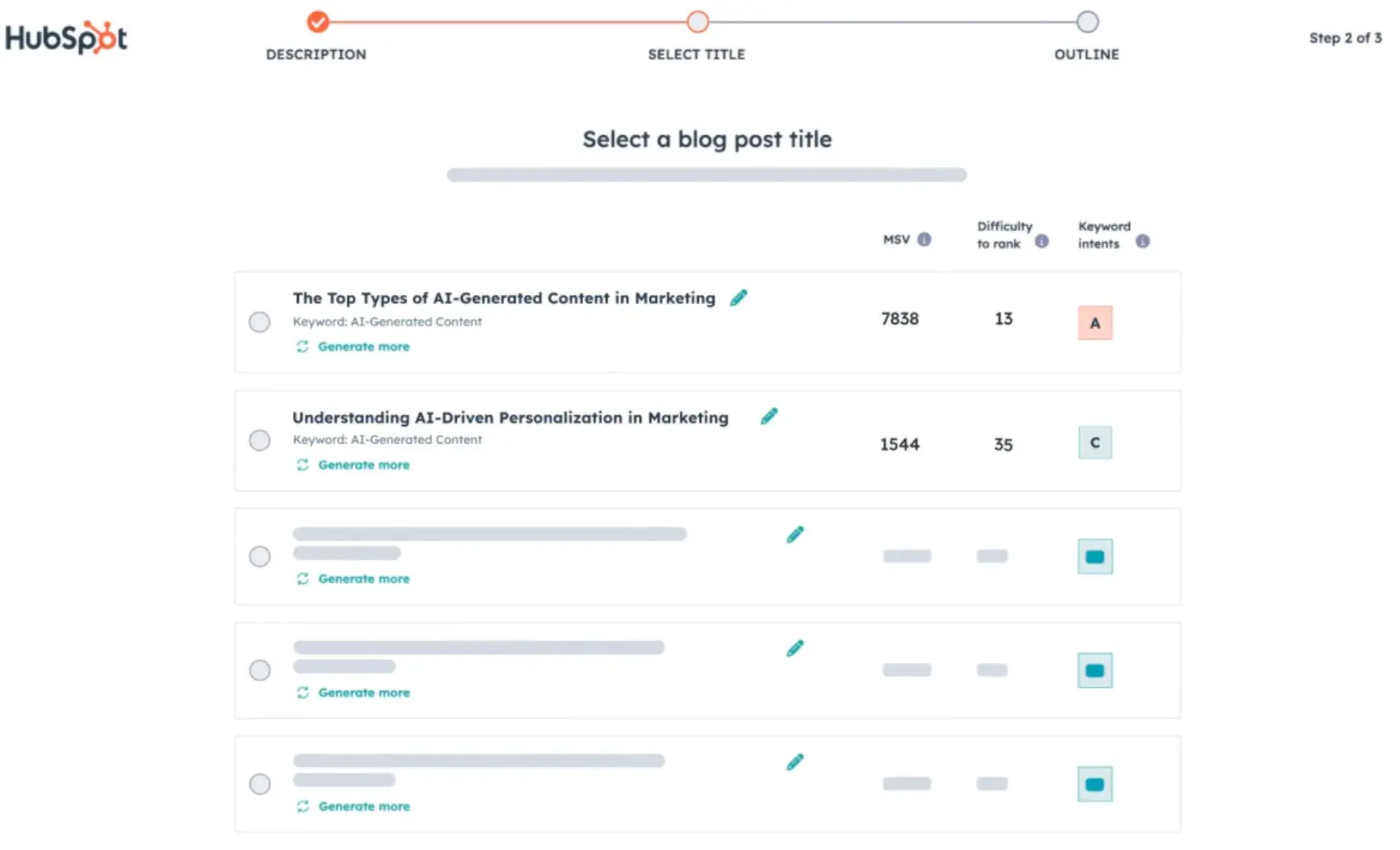
Content Consumption Trends
Device Trends
Mobile optimization is not a new concept anymore; in fact, it is a must and a given. According to our latest consumer trends survey, all demographics, except Boomers, use mobile devices to shop online.
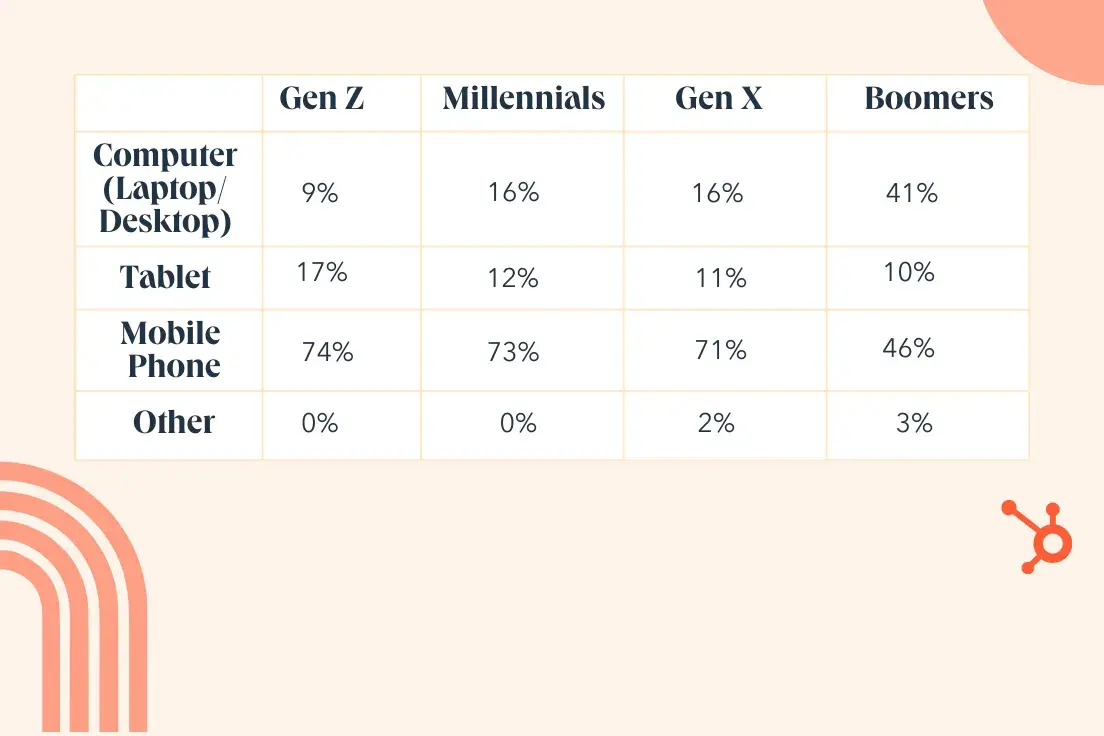
The data above is interesting, particularly if your product is suitable for a range of demographics. If you want to appease a range of demographics, your shopping experience must cater to all devices.
This device data is available within G4, and it should be considered when making marketing decisions.
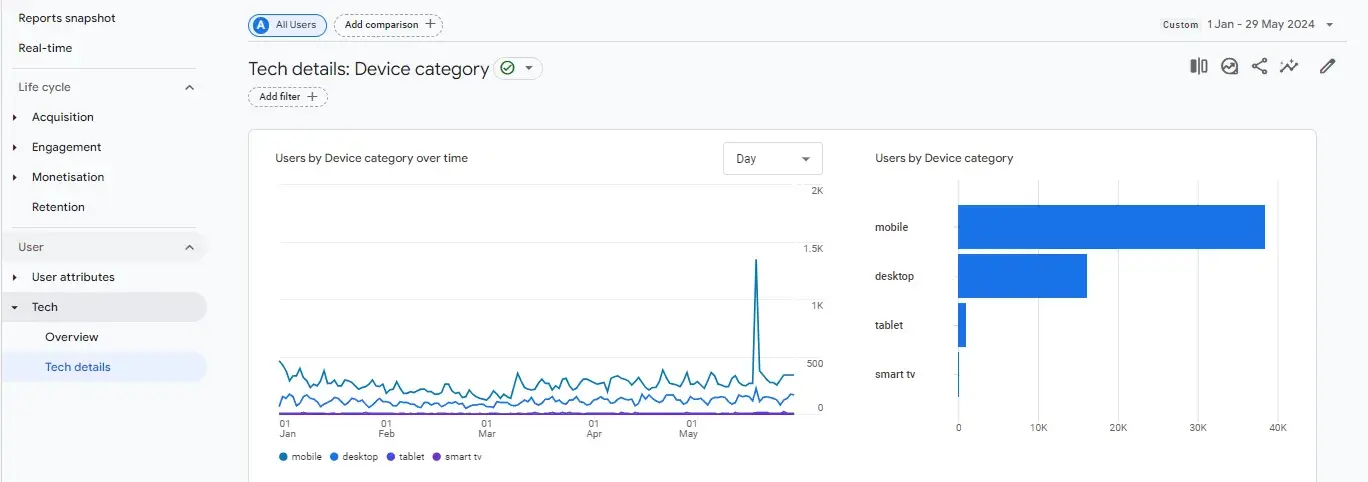
In the screenshot above, you can see the analytics data for my website. The majority of users visit from a mobile device.
This example is a top-level view, but you can also access data relating to the browser, device model, screen resolution, and more. I would highly encourage marketers to dig further into this data.
Mike Vannelli, creative director at Envy Creative, pays attention to how website traffic interacts with content and with what device.
Vannelli says, “In recent years, we’ve observed a significant shift in how audiences consume content, largely driven by the rising dominance of mobile devices and video content. Our analytics show a 70% increase in mobile consumption over the past two years, emphasizing the need for mobile-optimized content.”
Vannelli uses the data to inspire marketing action. He says, “We’ve adapted by implementing these insights into our content strategy, focusing on mobile-first formats and engaging, interactive content to meet the evolving preferences of our audience.”
Types of Content Users Consume to Learn About Products and Services
When learning about products and their features, consumers prefer searching the internet, television ads, and retail stores in almost equal weight.
Word-of-mouth came in second place, and streaming services in third. Gen Z is the only generation with a different first preference, which is learning about a product and its features through social media.
With this in mind, marketers can do things like
- Create an effective SEO keyword strategy to reach users browsing the internet.
- Use high-quality images and visuals for in-store advertisements to attract visitor attention.
- Ask for customer reviews and make it easy for customers to leave reviews so they can learn from others’ opinions about your business.
Under this same question, learning about a product and its features on social media came in fourth place. Among consumers with this preference, they like feed posts, ads or sponsored content, and short-form videos (like TikToks or Reels).
However, splitting these preferences up by generation paints a different picture.
Gen Z’s top preference for learning is short-form videos, story posts, social media marketplaces, or ads and sponsored content.
Millennials prefer short-form videos, ads or sponsored content, and marketplaces.
Gen X’s top preference is online communities, short-form videos, marketplaces, ads, and sponsored content.
Baby Boomers prefer ads or sponsored content, influencers, marketplaces, and online communities.
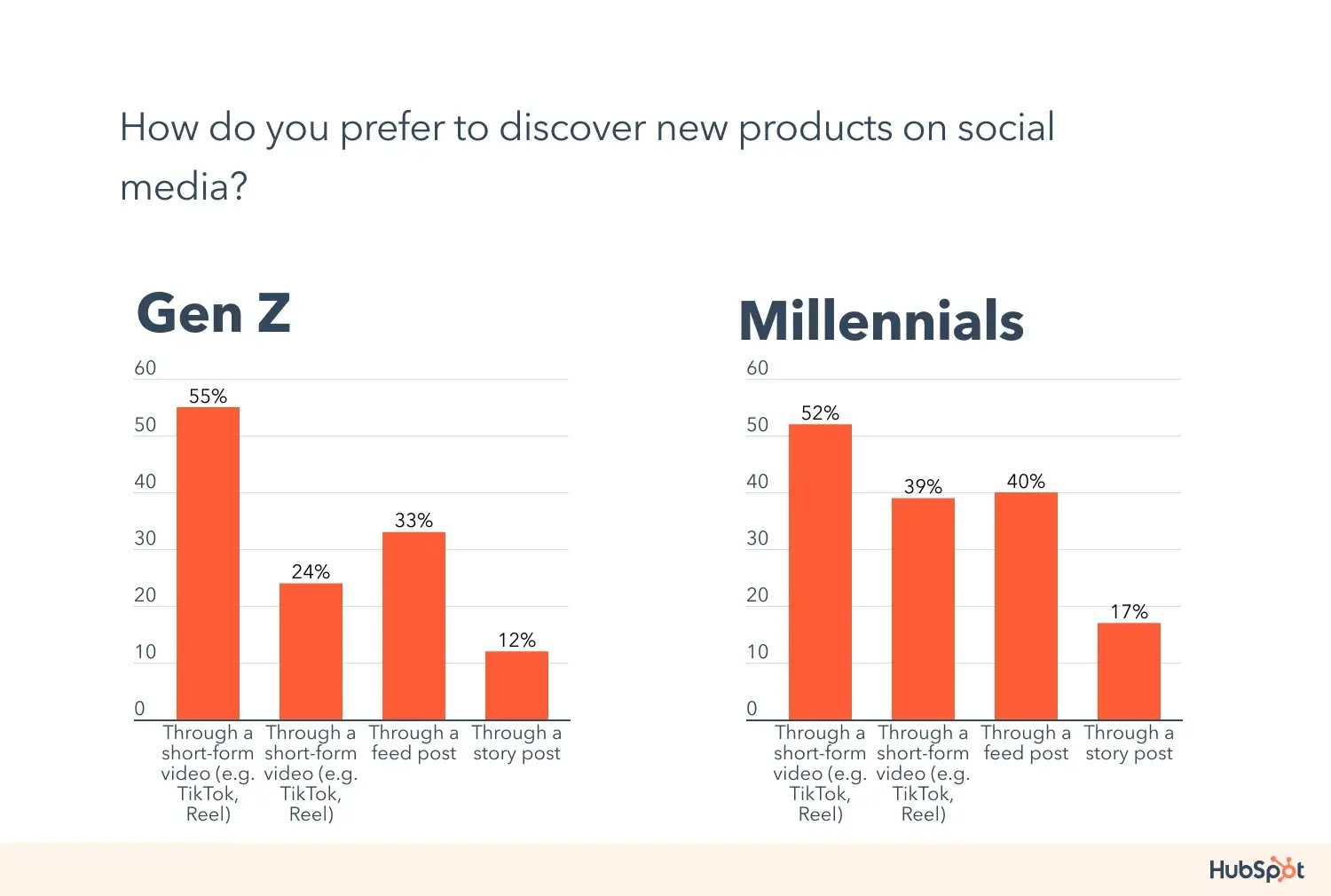
How do marketers measure up?
Here’s how marketers currently measure up to consumer preference:
- Most consumers have discovered new products in retail stores or through television ads, but their consumer preference is retail stores, followed by searches online and then word of mouth.
- 16% of marketers found that the website, blog and/or SEO (search engine optimization) had the largest ROI.
- 50% of marketers currently using influencer marketing plan to increase their investment in 2024.
- Marketers are finding that short-form videos have the biggest ROI, followed by content showing brand values and influencer marketing campaigns.
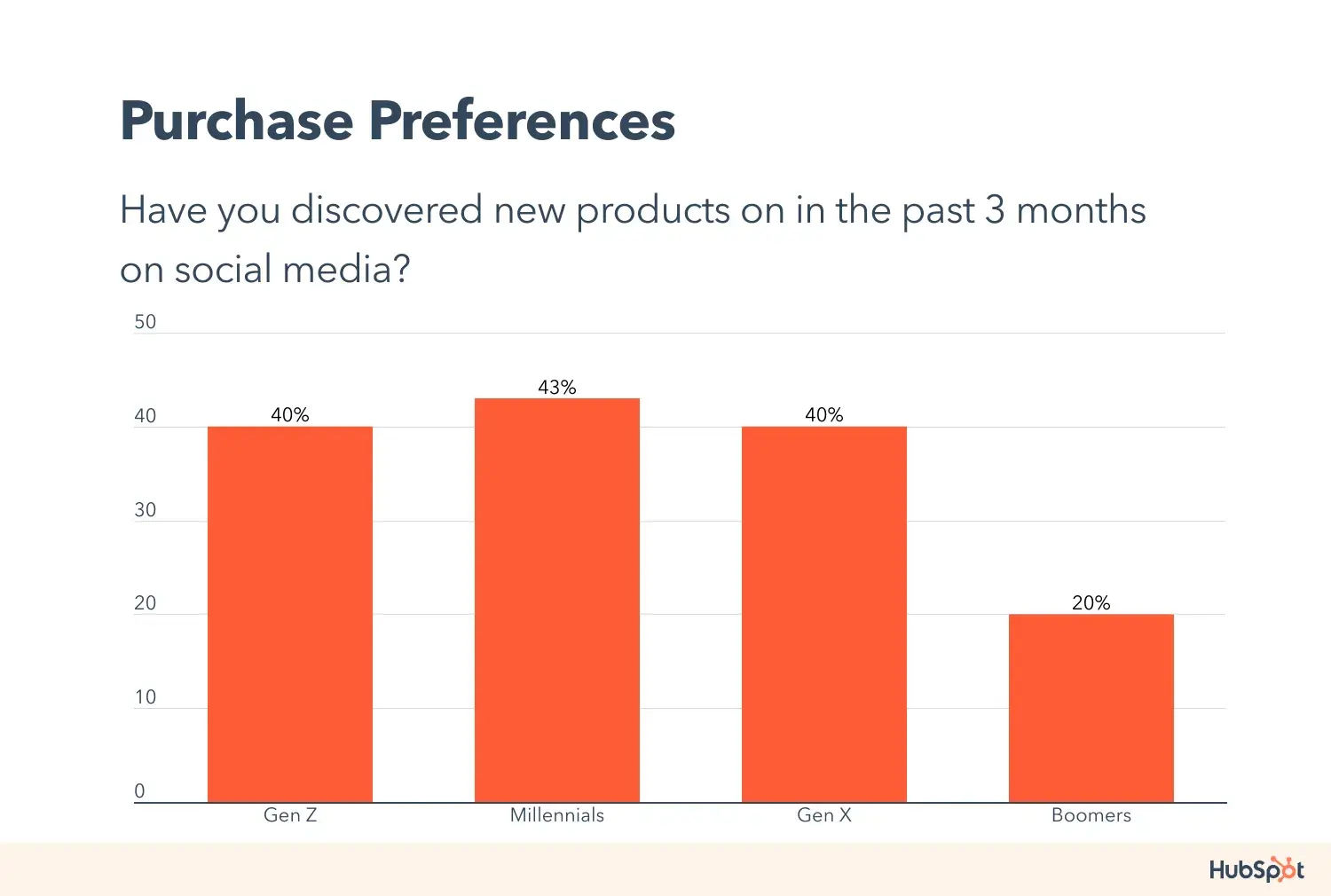
What can marketers do?
Pay attention to the top three preferences for learning about products, and go from there.
- Consumers like to see feed posts, so create a consistent posting schedule to remain top of mind and increase the likelihood of your products being seen.
- Consumers want to see ads or sponsored content, so you can run ads on your social profiles like paid partnerships, influencer campaigns, or paid ads (like a Facebook News Feed ad).
- Consumers also want to see short-form videos, so create TikToks, YouTube Shorts, etc. — snackable content for any platform.
Also, be mindful of generational differences if your target audience is primarily part of a specific generation.
For example, if Gen Z and Millennials are your primary audiences, you could focus on short-form videos and having a presence on platforms that cater to it.
If your audience is Baby Boomers or Gen Xers, you could create online communities in the channels they’re already in to speak to their needs.
Consumable Content Audiences Love
According to our Consumer Trends Survey, the most interesting and memorable content brands can share is funny content, relatable content, and content that showcases a brand’s product or service.
1. Funny Content
52% of consumers say that funny content is the most interesting and memorable. This trend has increased by 3% since the previous year.
How Marketers Measure Up
According to HubSpot’s 2024 Social Media Marketing Report, 92% of marketers plan to continue or increase their investment in memes in 2024
94% of marketers rate memes as having average or high ROI
What can marketers do?
Funny content can be anything from sending emails with a witty subject line or using a trending meme format and relating it to your business.
For example, Innocent Smoothies use funny images or memes.
In this Instagram post, Innocent shares, “21 things to wake you up in the morning,” and includes things like the bin lorry, a 9 am meeting, minty shower gel, and having a really good idea you need to write down.
Another valuable opportunity is to create funny video content, which is actually the most likely to go viral.
For example, Duolingo uses trends on Instagram reels to reach millions of accounts. This reel was a recent success.
2. Content Showcasing a Brand’s Products/Services
39% of consumers say content showcasing a brand’s products/services is most interesting and memorable.
How Marketers Measure Up
- 84% of social media marketers predict that in 2024, consumers will buy products from brands directly in social media apps more often than from third-party websites and from brand’s websites.
- 52% of social media marketers use social media to sell products directly within social media apps.
What can marketers do?
It could be worth marketers exploring different content to see what resonates and results in a conversion.
Bhavik Sarkhedi, CMO at Write Right, discovered a trend for personalized content. Sarkhedi says, “Personalization continues to be a key factor.”
They continue, “Consumers expect content that caters specifically to their preferences and behaviors. By utilizing data analytics, we’ve been able to create more targeted content, leading to a 50% increase in our email campaign open rates and a 20% increase in conversion rates.”
3. Relatable Content
38% of consumers say relatable content is the most interesting and memorable content brands can share on social media.
Almost 63% of consumers also say that social media content being authentic and relatable is more important than polished, high-quality content.
How Marketers Measure Up
Around 95% of marketers plan to continue or increase their investment in relatable, authentic content and content that reflects their brand’s values in 2024
What can marketers do?
Relatable content reminds your audiences of their lives, experiences, and needs. To be relatable to your audience, you need to understand them. Who are they? What are their pain points? What are their preferences?
Knowing the ins and outs of who they are helps you create content that relates to them as individuals. Consumers also want to build relationships with their favorite brands, so feeling like they can relate to your business and your business’ story can foster the connection they’re looking for.
A great way to build relatability is content that expresses your brand values.
4. Content That Reflects Brand Values
Content that reflects your brand values is the fourth most interesting and memorable content to consumers.
This makes sense as consumers, now more than ever, care about doing business with brands that share the same value systems and support the same causes that they do.
How Marketers Measure Up
Although consumers seem to value brand value content, only 9% of marketers report that branded content has the biggest ROI.
It’s worth noting that this content may not drive a final conversion but if consumers rate it, it’s probably worth continuing with it.
It bodes well that 95% of marketers plan to continue or increase their investment in relatable, authentic content and content that reflects their brand’s values.
What can marketers do?
Share your brand’s values on social media — let them know what you care about and what you do to take a stand.
Consumers will know what you care for, and you’ll draw in people who share similar interests and can turn curious browsers into paying customers if they find they truly relate to you.
It’s essential to be genuine in these efforts, as consumers aren’t shy to call out brands they feel are making empty promises or untrue statements.
At HubSpot, bringing brand values into content is really important. HubSpot has always shared its culture code with transparency.
5. Educational/Informational Content
25% of consumers say educational and informational content is interesting and memorable. Educational and informational content includes content like tutorials and expert interviews.
How Marketers Measure Up
- 36% of social media marketers say short-form video offers the highest ROI, the highest of any format.
- One-third of social media marketers plan to invest more in short-form video than any other content format this year.
- 43% of social media marketers plan to try short-form videos for the first time in 2024.
What can marketers do?
Marketers should first gain an understanding of what their consumer wants and how they prefer to consume content.
Rob Clegg, Senior Content Manager at Exclaimer, understands his audience’s need for information and then serves the need in the way the audience likes to be engaged.
He says, “IT professionals often visit our website seeking information about email signatures. They usually want to fix problems and soon find out that we offer a complete email signature solution.
“Interestingly, we‘ve found that about 40% of IT visitors didn’t know an email signature solution existed until they visited our website. This shows we have a big chance to teach and inform them.
By providing detailed information and explaining how our solution can help, we can show these professionals how to improve their email systems and make their communication strategies better.”
Clegg has different customer profiles visiting the website.
It’s not just IT professionals but marketers who Clegg understands prefer “Visually engaging content, such as videos, infographics, and interactive quizzes, because creativity and innovation are key in their field.
By presenting them with a variety of content, we can gradually introduce our business and highlight the advantages of email signature marketing. It’s a longer process but can be just as effective.”
6. Trendy Content
According to consumers, trendy content, including cultural moments and news stories, was the sixth most memorable type of content.
In total, 22% of consumers like this type of content, but it is the least favorite among Gen-Z (9%) and most appealing to Gen X (28%) and Millennials (24%).
How Marketers Measure Up
- 77% of marketing leaders say a strong brand is critical to their growth plans. In 2024, your brand must be culturally aware and responsive to trending topics and significant moments.
What can marketers do?
According to Ogivly, “To win attention and connect in this new environment, brands need to understand nuances and show empathy like never before.
Brands must not only react to culture but also embrace it and sometimes lead it. In 2024, social media success hinges on this cultural integration.”
The key to trending content is acting fast. Marketers need to consider the news, trending topics, and significant cultural moments.
Consider this: 62% of email marketing teams take two or more weeks to create an email. This long lead is less than ideal for marketers who could benefit from acting quicker.
Marketers must find an opportunity to streamline opportunities as much as possible. Although trends tend to be reactive, you can plan for annual trends of holidays that may generate interest.
When it comes to creation and distribution, marketers should think about tools like HubSpot’s Content Hub.
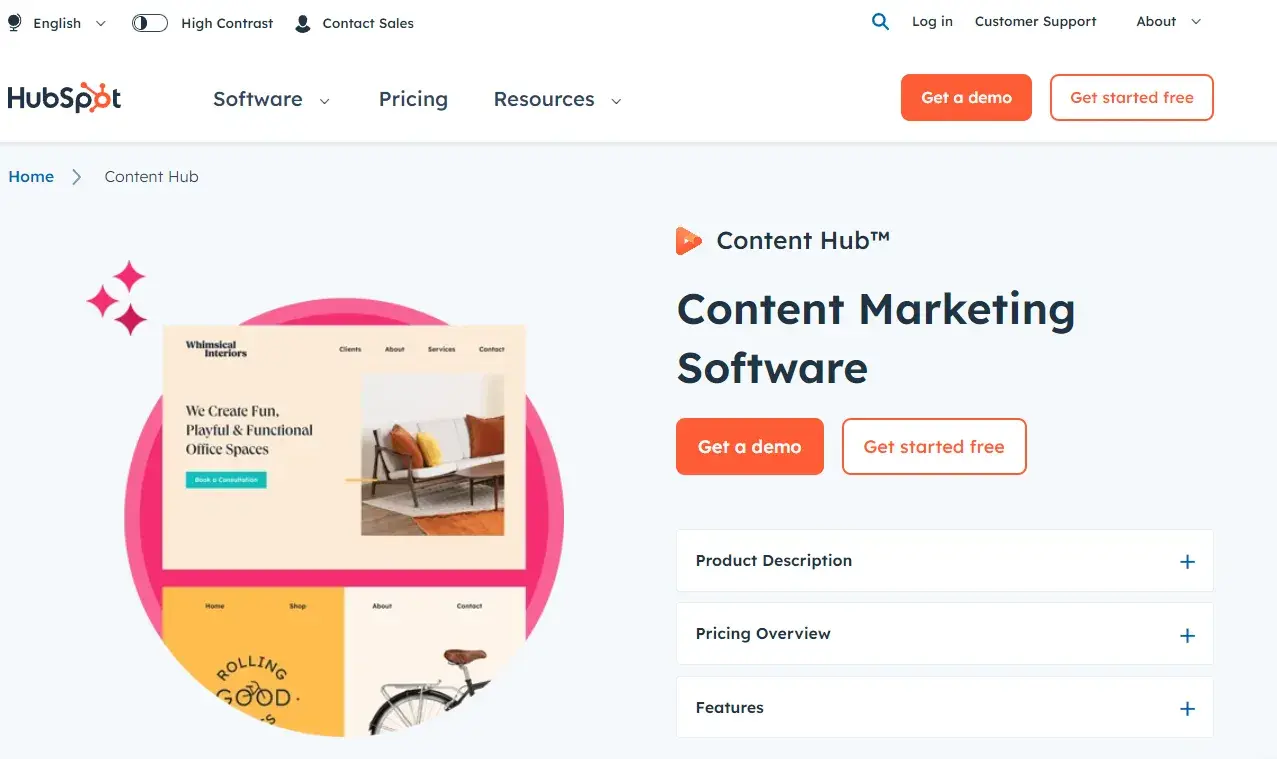
7. Behind-the-Scenes Content
Behind-the-scenes content includes meet-the-team videos, about-us videos, etc. Consumers rate this type of content as the seventh most memorable.
It’s most popular with millennial audiences: 35% of those surveyed rated behind-the-scenes content compared to 20% of Gen Xers, 15% of Boomers, and 13% of Gen Z.
How Marketers Measure Up
- HubSpot surveyed over 1,500 brand social media marketers. We’re seeing that the content that gets the most engagement is authentic and elicits an emotional response.
What can marketers do?
Behind-the-scenes content feels similar to the authentic content (point 3) that consumers love. Brands should consider posting more behind-the-scenes content and explore how the audience reacts.
Bhavik Sarkhedi, CMO at Write Right, found behind-the-scenes content garnered some of the most engagements. Sarkhedi knew that 54% of consumers want more video content from brands.
He said, “At Write Right, we’ve leveraged this trend by incorporating more video tutorials and behind-the-scenes looks into our content mix, which has seen engagement rates soar by over 30%.”
Data-Driven Marketers Stay Ahead of the Curve
Data-driven marketers will win in 2024 and beyond, so compare the consumer preferences in this post against what your business is doing, identify areas of opportunity, and solve for your customer.
Editor’s note: This post was originally published in July 2020 and has been updated for comprehensiveness.







![Download Now: The State of U.S. Consumer Trends [Free Report]](https://no-cache.hubspot.com/cta/default/53/ebf9ec8e-a468-455a-943e-80aa4e6be694.png)




